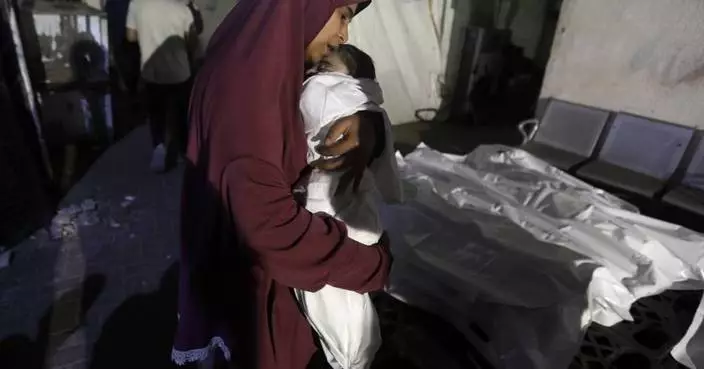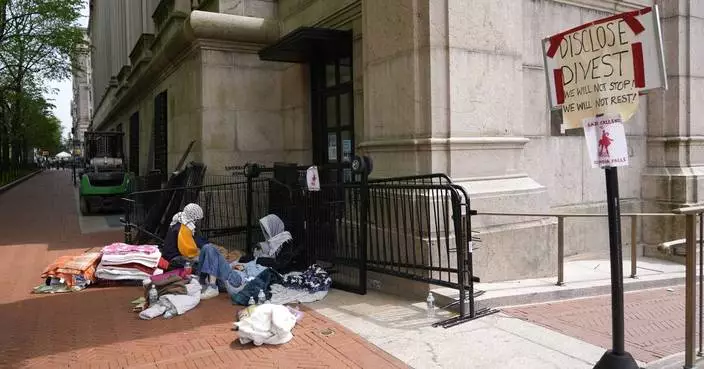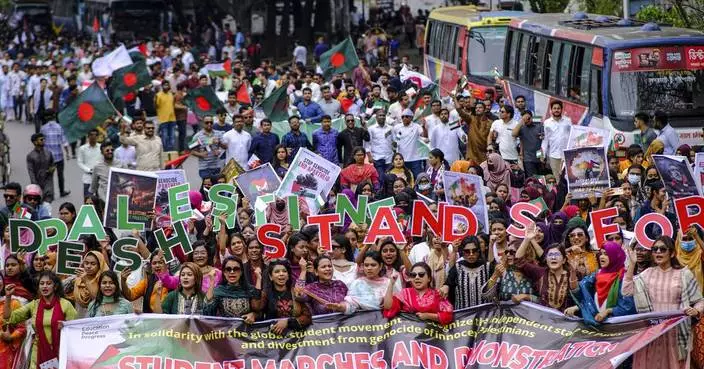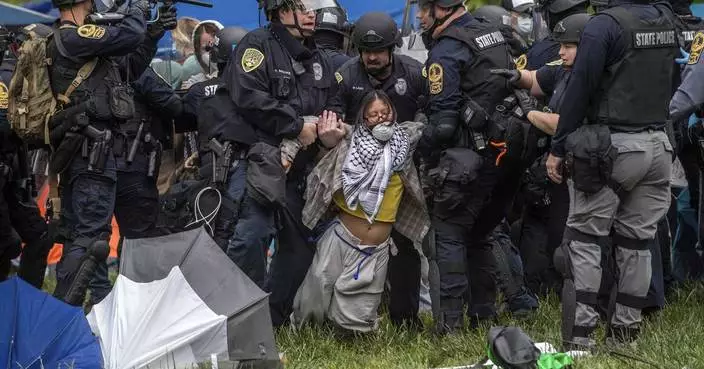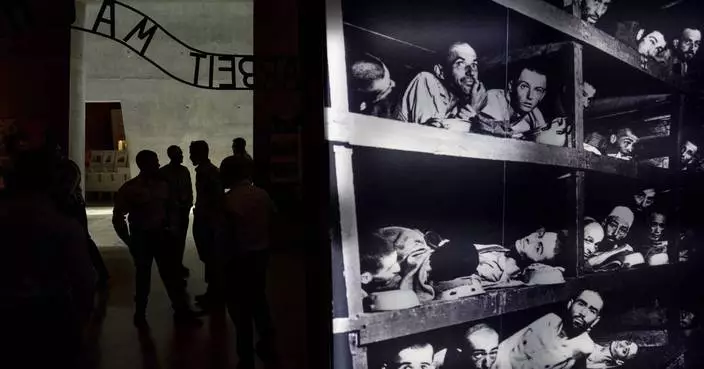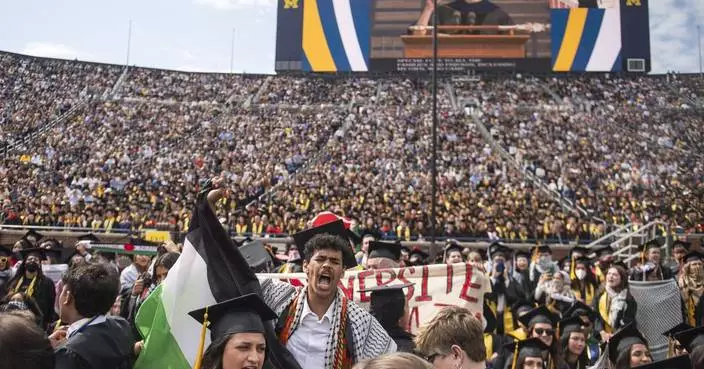Israel is intensively lobbying countries around the world to oppose a U.N. resolution criticizing President Donald Trump's decision to recognize Jerusalem as Israel's capital, Israeli officials said Wednesday.
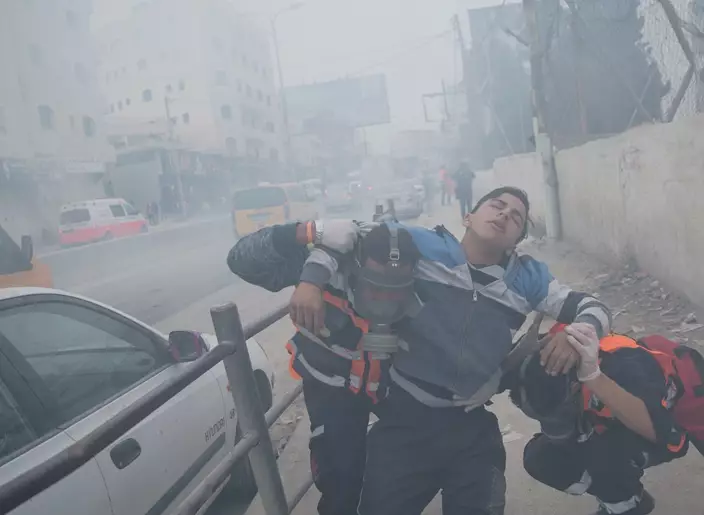
Two paramedics evacuate an injured Palestinian protester amid heavy teargas, during clashes with Israeli troops following protests against U.S. President Donald Trump's decision to recognize Jerusalem as the capital of Israel, at the outskirts of the West Bank city of Ramallah, Wednesday, Dec. 20, 2017. (AP Photo/Nasser Nasser)
Thursday's vote in the U.N. General Assembly will indicate whether Prime Minister Benjamin Netanyahu has succeeded in his efforts to drum up new pockets of support in the developing world, as well as the extent to which Israel and the U.S. are — or are not — alone on the question of Jerusalem.
The Palestinians have turned to the General Assembly after the U.S. vetoed a resolution this week in the Security Council calling on Trump to rescind his decision. While General Assembly votes, unlike Security Council resolutions, are not legally binding, they serve as a barometer of international sentiment on key issues.
The U.S. and Israel are both placing great weight on Thursday's vote. U.S. Ambassador Nikki Haley threatened U.N. member states with possible retaliation if they support the resolution, saying Trump takes the vote "personally" and the U.S. "will be taking names."
Trump went even further, telling reporters at a Cabinet meeting in Washington that opponents were likely to face a cutoff in U.S. funding. "For all these nations, they take our money and then vote against us," Trump said. "We're watching those votes. Let them vote against us. We'll save a lot. We don't care."
The comments brought accusations of U.S. intimidation.
Israel's deputy foreign minister, Tzipi Hotovely, said that the U.S. and Israel were making "immense efforts" to block the resolution.
"We have a very, very simple message: Jerusalem is the capital of the Jewish people for 3,000 years and the capital of Israel for almost 70 years," she told Channel 10.
An Israeli Foreign Ministry official confirmed the government was making a "very vast" lobbying campaign to minimize the resolution's impact.
He said Israel is trying to persuade allies to abstain or even vote against it. He also said that Israel has asked Jewish organizations in certain countries to lobby their governments on Israel's behalf.
The official, speaking on condition of anonymity because he was discussing sensitive diplomatic contacts, refused to identify which countries Israel has approached or say how he expects them to vote. But he said he thinks the campaign will be "successful to a certain extent."
In some ways, the vote is a test of Netanyahu's foreign policy. In recent years, the Israeli leader has invested great efforts to look beyond Israel's traditional allies in Washington and Western Europe and cultivate ties with developing nations that have traditionally been supportive of the Palestinians.
He has portrayed these efforts as both a savvy strategy aimed at opening new markets for Israeli technology exports, as well as countering what Israel says is a deep-seated bias against it at the United Nations.
This year alone, Netanyahu has visited China and hosted India's prime minister, Narendra Modi. He also has attended two summits in Africa, meeting with a host of leaders from across the continent, and in September, became the first sitting Israeli prime minister to visit Latin America with stops in Argentina, Mexico and Colombia.
The votes cast by these countries will provide an indication about whether the diplomatic outreach is paying off.
Votes by other key allies with traditionally close ties to Israel, including Germany, Britain, Australia, Canada and smaller European countries like the Czech Republic, the Netherlands, Poland and Hungary, could also provide valuable indicators about support for the U.S.-Israeli approach.
Many of these countries either abstained or opposed a landmark 2012 vote in the General Assembly that recognized Palestine with upgraded status as a nonmember state.
The Israeli official said a single vote at the U.N. on Thursday would not determine the success of Israel's diplomatic outreach. But he said "this is certainly part of it."
A draft of the U.N. resolution obtained by The Associated Press calls for affirming that any actions that "have altered the character, status or demographic composition of the Holy City of Jerusalem" have no legal effect and must be rescinded. It also calls upon all states "to refrain from the establishment of diplomatic missions" in Jerusalem.
Palestinian Foreign Minister Riad Malki, who was in New York for the vote, called the U.S. threats "dangerous" and predicted that they would not have a major impact. "We believe that there is world consensus against the U.S. decision on Jerusalem. This was clearly reflected in the Security Council, despite the U.S. veto," he told the AP.
Trump shattered decades of U.S. neutrality on Jerusalem on Dec. 6 when he recognized the holy city as Israel's capital and said he will move the U.S. Embassy there.
Trump said the move was not meant to prejudge negotiations on the final borders of the city, and instead merely recognized reality since Jerusalem already serves as Israel's capital.
But the announcement was widely perceived as taking the side of Israel in the most sensitive issue of the Israeli-Palestinian conflict.
The Palestinians claim east Jerusalem, home to key Muslim, Jewish and Christian holy sites, and which Israel captured and annexed in 1967, as the capital of a future state. The international community has said the status of Jerusalem should be decided in negotiations between Israel and the Palestinians.
Netanyahu has repeatedly praised Trump's decision and said he expects other nations to follow suit. But so far, the announcement has triggered mostly denunciations and demonstrations around the world.
Palestinian President Mahmoud Abbas' Fatah movement and other groups have organized mass protests while its rival, the Gaza-based Islamic militant group Hamas, has called for a third violent uprising against Israel. In all, eight Palestinians have been killed, most in clashes along the Gaza border with Israel.
The unrest continued on Wednesday as dozens of Palestinians clashed with Israeli forces in the West Bank town of Bethlehem, where protesters burned a large American flag and hurled stones at the Israelis. Demonstrators also scuffled with Israeli police in east Jerusalem and along the Gaza border.
Abbas has said that the U.S. can no longer serve as the sole Mideast mediator, and he has been trying to rally support in Europe and the Arab world.
On Wednesday, Abbas was meeting with leaders of Saudi Arabia, an influential country believed to have low-level but warming ties with Israel, before heading to France.
Israel's military says it is conducting “targeted strikes” against Hamas in the southern Gaza city of Rafah, after the country's War Cabinet approved a military operation there, officials said late Monday.
More than a million people are huddled in tents and overcrowded apartments in Rafah after fleeing Israel’s military offensive in other parts of the Gaza Strip. Israel says Rafah is Hamas' last stronghold, but the United States opposes a full-scale invasion of the city bordering Egyptian unless Israel provides a “credible” plan for protecting civilians there.
Hours earlier, the Hamas militant group announced it had accepted a cease-fire proposal brought forward by mediators Egypt and Qatar.
A cease-fire could end seven months of war in Gaza — however it’s uncertain whether a deal had been sealed. Israel responded by saying the proposal did not meet its “core demands.”
The war in Gaza has driven around 80% of the territory's population of 2.3 million from their homes and caused vast destruction to homes, hospitals, mosques and schools across several cities. The death toll in Gaza has soared to more than 34,500 people, according to local health officials.
The war began Oct. 7 when Hamas attacked southern Israel, killing around 1,200 people, mostly civilians, and abducting about 250 others. Israel says militants still hold around 100 hostages and the remains of more than 30 others.
Currently:
— Hamas accepts cease-fire proposal for Gaza after Israel orders Rafah evacuation ahead of attack.
— Yearly memorial march at the former death camp at Auschwitz overshadowed by Israel-Hamas war.
— Israel orders Al Jazeera to close its local operation and seizes some of its equipment.
— Netanyahu uses Holocaust ceremony to brush off international pressure against Gaza offensive.
Follow AP’s coverage of the war at https://apnews.com/hub/israel-hamas-war
Here's the latest:
CAIRO — A Palestinian security official and an Egyptian official say Israeli tanks entered the southern Gaza town of Rafah, reaching as close as 200 meters (yards) from its crossing with neighboring Egypt.
The Egyptian official said the operation appeared to be limited in scope. He and Hamas’ Al-Aqsa TV said Israeli officials informed the Egyptians that the troops would withdraw after completing the operation.
The Israeli military declined to comment. On Sunday, Hamas fighters near the Rafah crossing fired mortars into southern Israel, killing four Israeli soldiers.
The Egyptian official, located on the Egyptian side of Rafah, and the Palestinian security official spoke on condition of anonymity because they were not authorized to talk to the press.
The Associated Press could not independently verify the scope of the operation.
Earlier Monday, Israel’s War Cabinet decided to push ahead with a military operation in Rafah, after Hamas announced its acceptance of an Egyptian-Qatari proposal for a cease-fire deal. The Israeli military said it was conducting “targeted strikes” against Hamas in Rafah without providing details.
The Rafah border crossing is a critical entry point for humanitarian aid into Gaza.
Associated Press writer Lee Keath contributed to this report.
WASHINGTON — Biden administration officials on Monday continued to express concerns to the Israelis that a major military operation into Rafah’s densely populated areas could be catastrophic.
White House officials on Monday also were privately concerned about the latest strikes on Rafah — although the strikes did not appear to be the widescale attack Israeli Prime Minister Benjamin Netanyahu has been threatening., according to a person familiar with Biden administration thinking who was not authorized to comment publicly.
Associated Press writer Zeke Miller contributed to this report.
BEIRUT — Hamas has published a copy of the cease-fire and hostage release proposal that the militant group said it had agreed to on Monday.
The framework brought forward by Qatar and Egypt aims to bring a halt to seven months of war in Gaza. However, it's unclear if Israel will agree to the terms.
The proposal outlines a phased release of Israeli hostages held in Gaza alongside the gradual withdrawal of Israeli troops from the entire enclave and ending with a “sustainable calm” or “permanent cessation of military and hostile operations.”
Israel has previously said it would not agree to either a full withdrawal of its forces or a permanent cease-fire as part of a hostage release deal.
The first stage would last 42 days and would involve a partial withdrawal of Israeli forces from the Gaza Strip and the release of about 33 hostages held in the territory, including the remaining Israeli women — both civilians and soldiers — as well as children, older adults and people who are ill.
Thirty Palestinian prisoners held in Israel would be released in exchange for each Israeli civilian hostage and 50 in exchange for each female soldier.
Palestinians displaced in Gaza would be allowed to return to their home neighborhoods during that time.
The parties would then negotiate the terms of the next stage, under which the remaining civilian men and soldiers would be released, while Israeli forces would withdraw from the rest of Gaza. This phase would be conditioned on achievement of a “sustainable calm.”
The final stage would involve exchange of the bodies of hostages who died in captivity and the beginning of a reconstruction plan for the enclave that would take place over three to five years “under the supervision of a number of countries and organizations, including: Egypt, Qatar and the United Nations.”
TEL AVIV, Israel — Thousands of Israelis rallied around the country Monday night calling for an immediate deal to release the hostages still held in the Gaza Strip.
The protests came as Israel’s War Cabinet voted to begin an operation on the city of Rafah, saying that a cease-fire proposal Hamas accepted earlier in the night was not in line with Israeli demands.
In Tel Aviv, about 1,000 protesters swelled near Israel’s military headquarters, some blocking the city’s main highway until late into the night. Police tried to clear the road, lifting some protesters off the street and extinguishing fires lit during the demonstration. Other officers on horseback surrounded crowds who chanted “deal now!”
In Jerusalem, hundreds of protesters called for a hostage deal. They marched toward the home of Israeli Prime Minister Benjamin Netanyahu, holding a banner reading “the blood is on your hands.”
There were also smaller protests in the cities of Haifa, Beersheba and Raanana.
Israeli police did not immediately respond to a request about the number of people arrested.
In front of Netanyahu’s house stood Mai Albini Peri, the grandson of Haim Peri, a hostage in Gaza. He held a sign that read, “Rafah, not at the expense of my grandfather.”
JERUSALEM — Israeli leaders have approved a military operation into the Gaza Strip city of Rafah, and Israeli forces are now striking targets in the area, officials announced Monday.
The move came hours after Hamas announced it had accepted an Egyptian-Qatari cease-fire proposal.
Prime Minister Benjamin Netanyahu’s office said that the proposal was “far from Israel’s essential demands,” but that it would nonetheless send negotiators to continue talks on a cease-fire agreement.
The United States says it opposes a Rafah invasion unless Israel provides a “credible” plan for protecting civilians there. More than a million people in Rafah are huddled in tents and overcrowded apartments after fleeing Israel’s military offensive in other parts of the territory.
Earlier Monday, Israel’s military said it ordered around 100,000 people to evacuate Rafah, signaling the long-promised ground invasion could be imminent. Israel says Rafah is Hamas’ last stronghold.
JERUSALEM — Israel will keep carrying out operations in Gaza as officials deliberate over a cease-fire proposal approved by Hamas, an Israeli military spokesperson says.
Rear Adm. Daniel Hagari spoke after the Hamas militant group said it accepted an Egyptian-Qatari cease-fire proposal to halt the seven-month war with Israel. Israeli officials were studying the proposal late Monday and did not immediately comment.
“We examine every answer and reply very seriously,” said Hagari. “At the same time, we continue our operations in the Gaza Strip and will continue to do so.”
During the same address, Hagari said that Israel would reopen a major crossing for humanitarian aid to pass into Gaza as soon as possible, without specifying exactly when.
Israel closed the Kerem Shalom crossing Sunday after a Hamas mortar attack in the area killed four Israeli soldiers.
The White House said earlier Monday that Israeli Prime Minister Benjamin Netanyahu had agreed to reopen the crossing on a phone call with President Joe Biden.
WASHINGTON — President Joe Biden has been briefed on Hamas’ response in ongoing cease-fire talks, White House National Security Council spokesman John Kirby said, adding only that the U.S. and its partners were still reviewing that response.
CIA Director Bill Burns was actively engaged with partners in the region to evaluate the Hamas statement and next steps, Kirby said.
Hamas announced Monday it has accepted an Egyptian-Qatari cease-fire proposal, but Israel said it was studying the offer, leaving it uncertain whether a deal had been sealed to bring a halt to the seven-month-long war in Gaza.
ANKARA, Turkey — Turkish President Recep Tayyip Erdogan welcomed a statement by the Hamas militant group that it has accepted a cease-fire proposal, and he called on Israel to also accept the deal.
Speaking at the end of Cabinet meeting Monday, Erdogan also urged Western nations to exert pressure on Israeli to accept the deal. He suggested that Turkey had urged Hamas to accept the proposal.
“We were happy by the statement from Hamas that it accepted the cease-fire with our recommendations. The same step must now be also taken by Israel. I call on all Western actors to exert pressure on Israel,” Erdogan said.
Turkey, a vocal critic of Israel’s military actions in Gaza, suspended trade relations with Israel last week. It said the commercial ties won’t be restored until a permanent cease-fire is installed and obstructions to the flow of aid into Gaza are removed.
JERUSALEM -- An official familiar with Israeli thinking says Israeli officials are examining the cease-fire proposal approved by Hamas.
But the official warns that the plan approved by Hamas “is not the framework Israel proposed.”
The official, speaking on condition of anonymity because Israel is still formulating a formal response, did not elaborate.
The language signaled that a deal could still be a ways off.
Associated Press writer Josef Federman contributed to this report.
WASHINGTON — A U.S. official said that Washington was still waiting to learn more about the Hamas position and whether it reflected an agreement to what had already been signed off on by Israel and international negotiators or to something else.
Details of the proposal haven't been released. The official was speaking on condition of anonymity because they weren't authorized to publicly discuss the matter.
Hamas announced Monday it has accepted an Egyptian-Qatari cease-fire proposal, but there was no immediate word from Israel, leaving it uncertain whether a deal had been sealed to bring a halt to the seven-month-long war in Gaza.
Associated Press writer Zeke Miller contributed to this report.
The Hamas militant group says it has accepted an Egyptian-Qatari cease-fire proposal to halt the seven-month war with Israel.
It issued a statement Monday saying its supreme leader, Ismail Haniyeh, had delivered the news in a phone call with Qatar’s prime minister and Egypt’s intelligence minister. The two Middle Eastern nations have been mediating months of talks between Israel and Hamas. There was no immediate comment from Israel.
The announcement came hours after Israel ordered Palestinians to begin evacuating the southern Gaza town of Rafah ahead of an Israeli military operation. Israel says Rafah is Hamas’ last stronghold.
News of Hamas’ announcement sent people in Rafah cheering in the streets. People rushed into the streets in front of Al-Aqsa Hospital in Deir al-Balah in the Gaza Strip, chanting and cheering the news.
Details of the proposal were not immediately released. But in recent days, Egyptian and Hamas officials have said the cease-fire would take place in a series of stages in which Hamas would release hostages it is holding in exchange for Israeli troop pullbacks from Gaza.
It is not clear whether the deal will meet Hamas’ key demand of bringing about an end to the war and complete Israeli withdrawal.
GENEVA — The U.N. human rights chief says it’s “inhumane” that people in Gaza are being told to move again as Israel plans an invasion into the southern city of Rafah.
Volker Türk warned that civilian suffering, death and destruction appear set to swell further, insisting that protection of civilians is the “overriding concern” of international humanitarian and human rights law — and those who “flout” it must be held to account.
“Forcibly relocating hundreds of thousands from Rafah to areas which have already been flattened and where there is little shelter and virtually no access to humanitarian assistance necessary for their survival is inconceivable,” he said in a statement.
Türk noted that Rafah has become the main hub for distribution of humanitarian aid into the Gaza Strip. He reiterated calls for a cease-fire, the free flow of aid into Gaza, and the release of Israeli hostages held in the territory.
Hundreds of thousands of people in Gaza have been ordered to evacuate their homes and shelters since Israeli forces launched a military action in the strip following the Oct. 7 attacks in Israel
JERUSALEM -- Israel’s blockage of Al Jazeera’s news website appeared to take effect Monday, a day after Israel shut the local offices of the Qatari network and halted its broadcasts in Israel.
The network’s website was no longer accessible on local Wi-Fi networks in Israel as of Monday afternoon, although it could still be viewed using virtual private networks, or VPNs. Access to the network’s YouTube livestream and social media feeds appeared undisturbed. Al Jazeera went off Israel’s main cable and satellite providers Sunday.
Believed to be the first time Israel has closed a foreign news outlet operating in the country, the shuttering of Al-Jazeera’s operation marks the culmination of a long-running feud that has only been exacerbated by the network’s coverage of the current Israel-Hamas war.
Since Hamas militants’ initial cross-border attack Oct. 7, the network has maintained 24-hour coverage of Israel’s grinding ground offensive in the Gaza Strip. While including on-the-ground reporting of the war’s casualties, including the deaths of members of its own staff, its Arabic arm often publishes verbatim video statements from Hamas and other regional militant groups.
Israel’s Prime Minister Benjamin Netanyahu said Sunday that it had become necessary to remove the network, calling it a “Hamas mouthpiece.”
The Foreign Press Association in Israel criticized the order.
“With this decision, Israel joins a dubious club of authoritarian governments to ban the station,” it said. “This is a dark day for the media.” The New York-based Committee to Project Journalists similarly warned the move represented an “extremely alarming precedent for restricting international media outlets working in Israel.”
JERUSALEM — The U.N. children’s agency says an Israeli ground operation in Rafah would pose “catastrophic risks” to children sheltering in the southern Gaza city.
UNICEF estimates some 600,000 children are in Rafah – roughly half the city’s population. Most of those people are huddling in tents and overcrowded apartments after fleeing Israel’s military offensive in other parts of the territory.
In a statement Monday, UNICEF warned that many of the children are “highly vulnerable.”
It said an estimated 65,000 children suffer from a pre-existing disability and an estimated 175,000 children under the age of 5 suffer from one or more infectious diseases. Almost all children, it said require mental health services.
“More than 200 days of war have taken an unimaginable toll on the lives of children,” said Catherine Russell, UNICEF’s executive director. “Rafah is now a city of children, who have nowhere safe to go in Gaza. If large scale military operations start, not only will children be at risk from the violence, but also from chaos and panic, and at a time where their physical and mental states are already weakened.”
UNICEF called for a lasting cease-fire and release of hostages held by Hamas.
WASHINGTON — President Joe Biden and Israeli Prime Minister Benjamin Netanyahu spoke Monday morning, a White House official said, as Israel appeared closer to launching an offensive on the southern Gaza city of Rafah — a move staunchly opposed by the U.S. on humanitarian grounds.
A National Security Council spokesperson said Biden reiterated U.S. concerns about an invasion of Rafah said he believes reaching a ceasefire with Hamas is the best way to protect the lives of Israeli hostages held in Gaza.
The two officials spoke on the condition of anonymity to discuss the call before an official White House statement was released.
The Biden administration, which provides Israel crucial military and diplomatic support, says it opposes a Rafah invasion unless Israel provides a “credible” plan for protecting civilians there.
The United Nations humanitarian aid agency has warned that hundreds of thousands of people would be “at imminent risk of death” if Israel carries out a military assault into Rafah. The city on the border with Egypt is a critical entry point for humanitarian aid and is filled with displaced Palestinians, many in densely packed tent camps.
Associated Press writer Zeke Miller contributed to this report.
CAIRO -- Egypt has urged Israel to “exercise maximum restraint and avoid further escalation at this extremely sensitive time in the process of cease-fire negotiations.”
In a statement Monday, the Egyptian Foreign Ministry warned against Israel’s imminent offensive in Gaza’s southernmost city of Rafah. It says such an escalation will cause grave humanitarian risks to over a million Palestinians packed in the city.
The statement said Egypt continues to communicate with all parties to “prevent the situation from getting worse or getting out of control.”
Egypt has been a key mediator in ongoing efforts to broker a cease-fire that would halt Israel’s offensive in Gaza in exchange for the release of Israeli hostages held by Hamas.
BERLIN — Germany and France have reiterated their opposition to Israel's planned offensive on Rafah in the south of the Gaza Strip.
A spokesperson for the German Foreign Office said Monday that more than 1 million people are currently living in the area, adding that “these people need protection ... and the German government and the foreign minister have already said repeatedly in the past that a large-scale ground offensive on Rafah would be a humanitarian disaster.”
At the same time, the spokesperson, Kathrin Deschauer, condemned the continued attacks by Hamas on Israel from the Gaza Strip, and called for the release of over 100 people “who are still held hostage by Hamas, who need to be freed.”
All sides must now make “maximum efforts,” she said, so that Palestinians in Gaza can be supplied with humanitarian goods and the hostages can be freed at the same time.
In Paris, the Foreign Ministry reiterated France's “firm opposition to Israel’s offensive in Rafah,” saying more than 1.3 million people are “in grave situation" after seeking shelter there.
France warned that “displacing civilian population by force constitutes a war crime under international law.”
The Foreign Ministry reiterated its position on the Israel-Hamas war, demanding an immediate release of Israeli hostages and a sustained cease-fire in Gaza to protect civilians.
On Sunday, French President Emmanuel Macron spoke with Israeli Prime Minister Netanyahu and urged him to follow through with the negotiations that could ‘’lead to the release of hostages, the protection of civilians by a cease-fire and regional de-escalation,’’ according to Macron’s office.
"’The destiny of the Palestinians of Gaza can no longer be subject to the terrorist actions of Hamas, and the Israeli operations should stop,’’ Macron said, and reiterated his ‘’firmest opposition’’ to an Israeli offensive in Rafah.
BEIRUT — The militant Palestinian group Hamas warned Israel on Monday that any military operation in the southern city of Rafah in the Gaza Strip "will not be a picnic."
Hamas said in statement that Palestinian militant groups, led by Hamas’ military wing, the Qassam Brigades, “are ready to defend our people and defeat the enemy.”
The statement was the first official comment since the Israeli army ordered tens of thousands of Palestinians in Rafah to start evacuating, signaling that a long-promised ground invasion could be imminent.
Hamas called on the international community to move quickly “to stop the crime that is threatening the lives of hundreds of thousands of civilians.” It also called on international agencies including the U.N. agency for Palestinian refugees to stay in Rafah and support the people there.
BEIRUT — The Gaza Health Ministry said Monday the bodies of 52 people killed by Israeli strikes have been brought to local hospitals over the past 24 hours. Hospitals also received 90 wounded, it said in its daily report.
That brings the overall Palestinian death toll from the Israel-Hamas war to at least 34,735 the ministry said, and 78,108 wounded.
The Health Ministry does not distinguish between fighters and civilians in its tallies, but says that women and children make up around two-thirds of those killed.
The Israeli military says it has killed 13,000 militants, without providing evidence to back up the claim.
BEIRUT -- Dutch Foreign Minister Hanke Bruins Slot on Monday called for an urgent “diplomatic solution” to end intensifying clashes between the Lebanese Hezbollah militant group and the Israeli military along the tense Lebanon-Israel border.
“The Netherlands has grave concerns about rising tensions in the border region and intensified fighting, and we regret the loss of innocent civilian lives,” Bruins Slot said following a meeting with her Lebanese counterpart, caretaker Foreign Minister Fouad Bou Habib in Beirut. “And this has implications for Lebanon and the wider region.”
Israel, which sees Hezbollah as its most direct threat, has not ruled out a war in southern Lebanon. It estimates that the Iran-backed Shiite group has some 150,000 rockets and missiles aimed at the country. Hezbollah and Israel fought a monthlong war in 2006 that ended in a tense stalemate.
Western diplomats have scrambled to halt the hostilities. Hezbollah, and ally of the militant Palestinian group Hamas, has maintained that it would stop its attacks on northern Israel when the Hamas-Israel war ends.
JERUSALEM — The Norwegian Refugee Council has condemned the Israeli army’s “forced, unlawful” evacuation order in Rafah, saying that it could lead to “the deadliest phase of this conflict.”
Jan Egeland, secretary-general of the international nonprofit organization, says there are not enough resources in Israel’s self-declared Muwasi humanitarian zone, where the army instructed some 100,000 people in Rafah to relocate on Monday.
“The area is already overstretched and devoid of vital services,” Egeland said.
He says his organization and other international humanitarian groups are struggling to provide essential support for Palestinians in Gaza. More than half of Gaza’s 2.3 million residents are currently located in Rafah, while Israel’s government has vowed to press on with a military operation in Gaza’s southernmost city.
JERUSALEM -- The Israeli army says a fourth soldier has died from wounds sustained in a Hamas rocket attack on the border with Gaza.
Hamas launched at least 10 rockets toward soldiers positioned on the border Sunday, killing three other soldiers.
The attack occurred near Kerem Shalom, a major crossing point for international aid being delivered to Gaza, and came as Israel is preparing a possible invasion into the nearby Palestinian city of Rafah.
Israel has shuttered Kerem Shalom indefinitely, and on Monday, it began ordering civilians to evacuate parts of eastern Rafah, near the border, ahead of an expected military operation.
RAFAH, Gaza Strip -- The United Nations agency serving Palestinian refugees says it will not comply with an Israeli military order to evacuate parts of the southern Gaza city of Rafah.
Juliette Touma, communications director for UNRWA, says the agency has not evacuated the area and has no plans to do so. She says it has thousands of employees in the city.
“UNRWA will not take part in any forced evacuation of the population in Rafah or elsewhere in Gaza,” she said. “We are committed to staying and delivering humanitarian assistance.” She called for a cease-fire.
Relations between Israel and UNRWA have long been strained and further deteriorated during the seven-month war.
Israel has accused UNRWA of collaborating with the Hamas militant group and called for the agency’s closure.
UNRWA, the largest international provider of aid and services in Gaza, denies the accusations.
BERLIN — Germany’s Foreign Office on Monday condemned the shutdown of Qatar’s Al Jazeera satellite news network in Israel.
The Foreign Office wrote on X that “a free and diverse press landscape is the cornerstone of every liberal democracy. In times of conflict especially, it is of crucial importance to protect the freedom of the press.”
“The decision of the Israeli authorities to shut down Al Jazeera in Israel is the wrong signal,” the ministry said.
Germany has for decades been a staunch supporter of Israel. Berlin, however, has gradually shifted its tone as civilian casualties in Gaza have soared, becoming increasingly critical of the humanitarian situation in Gaza and speaking out against a ground offensive in Rafah.
JERUSALEM — The Israeli army has ordered tens of thousands of people in the southern Gaza city of Rafah to begin evacuating, signaling that a long-promised ground invasion could be imminent.
The announcement on Monday complicated last-ditch efforts by international mediators, including the director of the CIA, to broker a cease-fire. Hamas and Qatar, a key mediator, have warned that an invasion of Rafah could derail the talks.
Israel has described Rafah as the last significant Hamas stronghold after seven months of war, and its leaders have repeatedly said they need to carry out a ground invasion to defeat the Islamic militant group.
Lt. Col. Nadav Shoshani, an army spokesman, said some 100,000 people were being ordered to move to a nearby Israel-declared humanitarian zone called Muwasi. He said Israel was preparing a “limited scope operation” and would not say whether this was the beginning of a broader invasion of the city. But last October, Israel did not formally announce the launch of a ground invasion that continues to this day.
BEIRUT — An Israeli airstrike on northeastern Lebanon wounded three people and destroyed a building, Lebanon’s state-run National News Agency says.
The strike on the village of Safri early Monday targeted a factory in the eastern Bekaa Valley, the agency said without giving further details.
The Israeli military said its fighter jets struck a Hezbollah military structure in Safri.
Monday’s strike came after a tense day along the Lebanon-Israel border during which an Israeli airstrike on a village near the border killed four Lebanese civilians.
The militant Hezbollah group said it fired dozens of rockets in retaliation toward northern Israel.
The Lebanon-Israel border has seen almost daily exchange of fire since a day after the Israel-Hamas war started on Oct. 7.
Israeli strikes have killed more than 350 people in Lebanon, most of them fighters with Hezbollah and allied groups but also including more than 50 civilians. In Israel, strikes from Lebanon have killed at least 10 civilians and 12 soldiers.
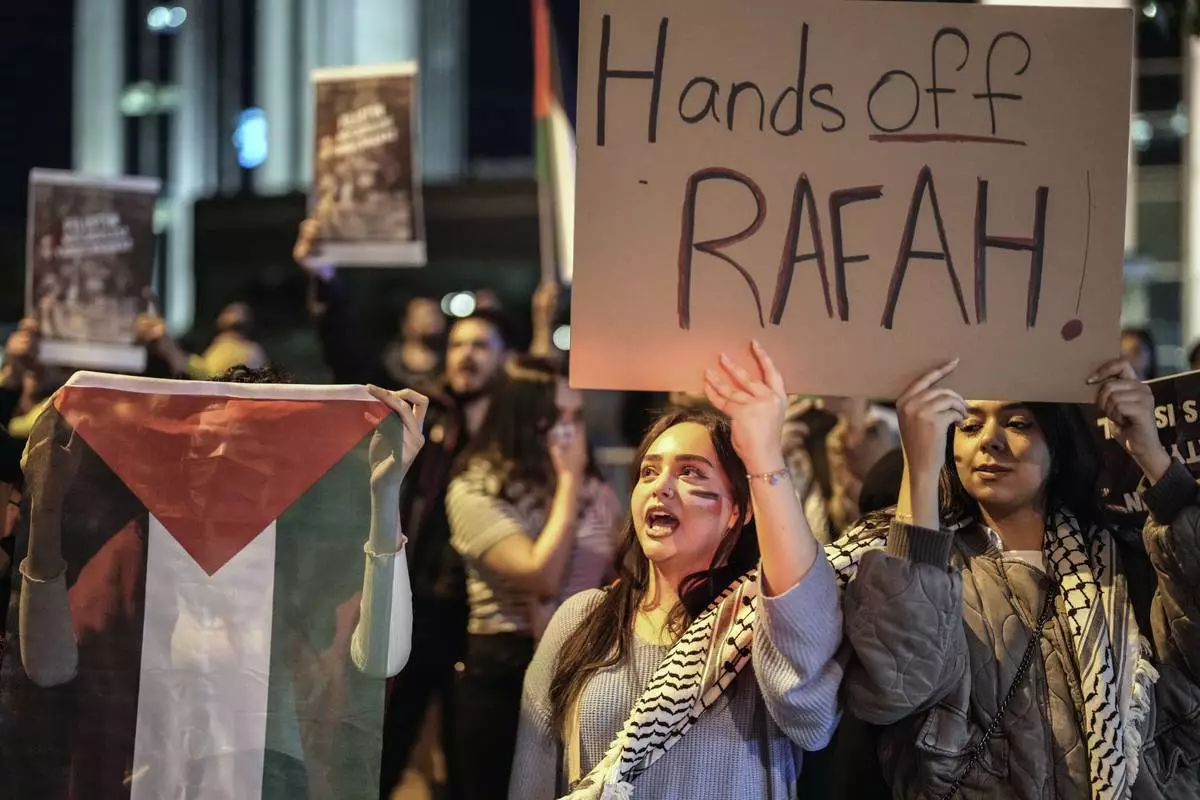
Demonstrators protest in solidarity with Gaza, outside the Israeli consulate in Istanbul, Monday, May 6, 2024. (AP Photo/Emrah Gurel)
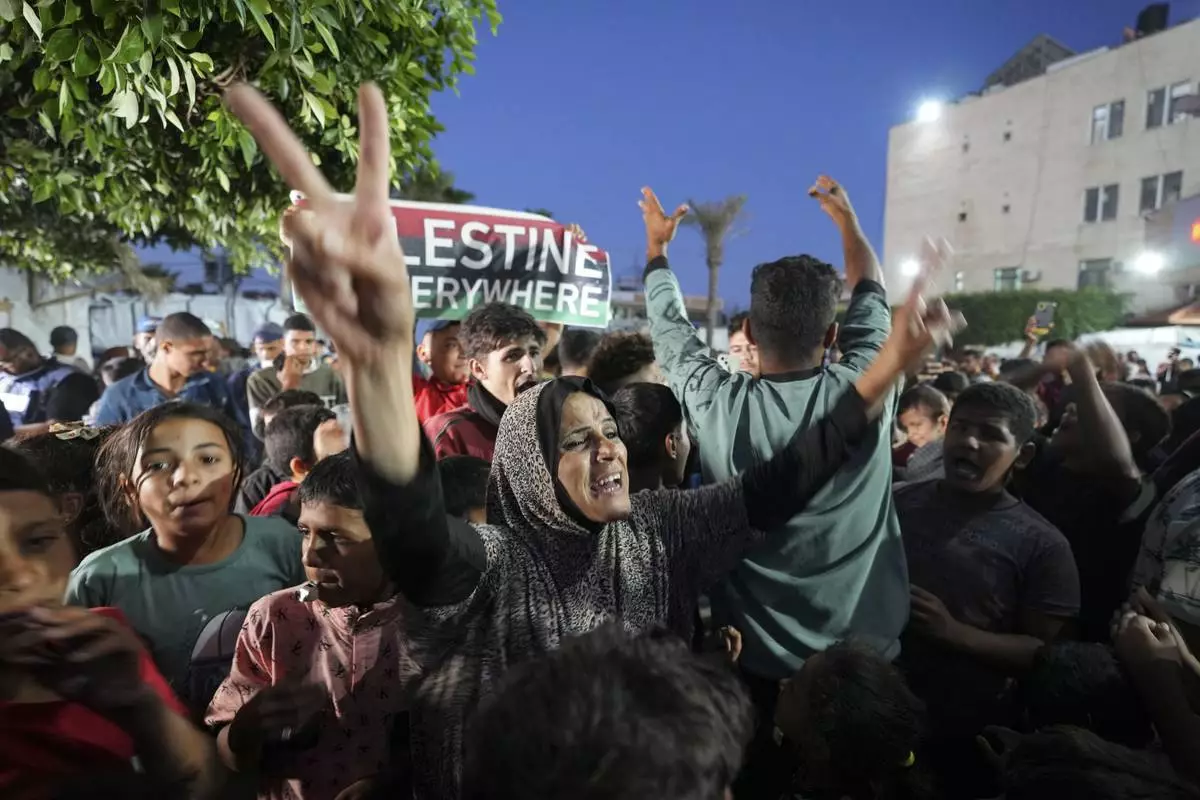
Palestinians celebrate in the streets following Hamas's announcement that it accepted a cease-fire proposal in Deir al-Balah, Gaza Strip on Monday, May 6, 2024. Despite the Hamas announcement, Israel said later Monday it would move forward with its planned offensive on Rafah, in the south of the strip. (AP Photo/Abdel Kareem Hana)
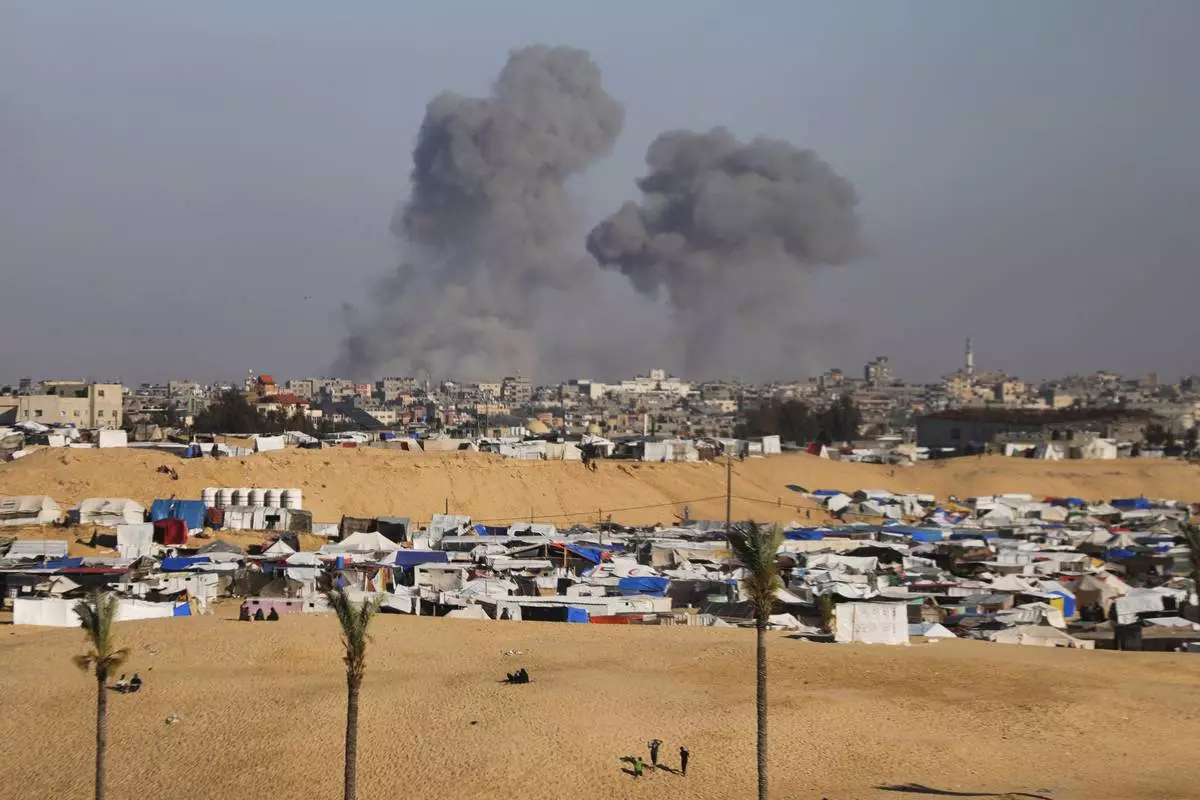
Smoke rises following an Israeli airstrike east of Rafah, Gaza Strip, Monday, May 6, 2024. (AP Photo/Ismael Abu Dayyah)
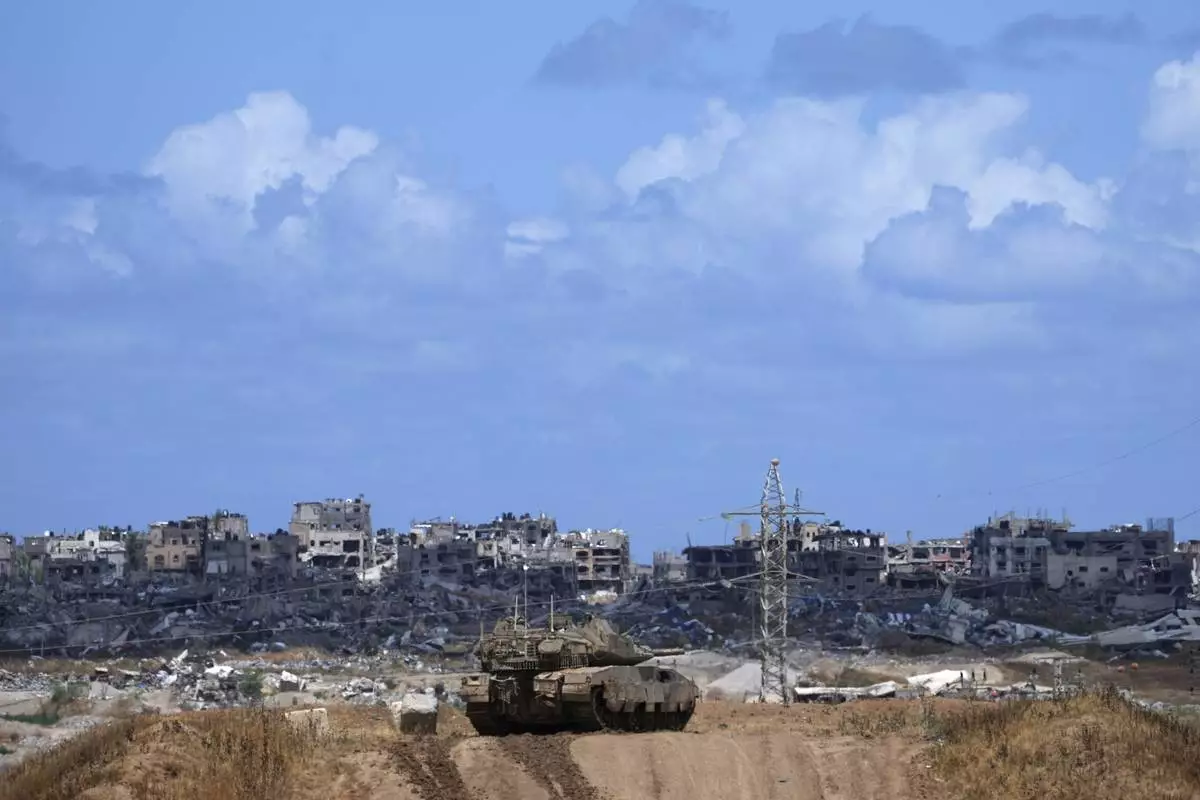
An Israeli tank overlooks the Gaza Strip, as seen from southern Israel, Monday, May 6, 2024. (AP Photo/Tsafrir Abayov)
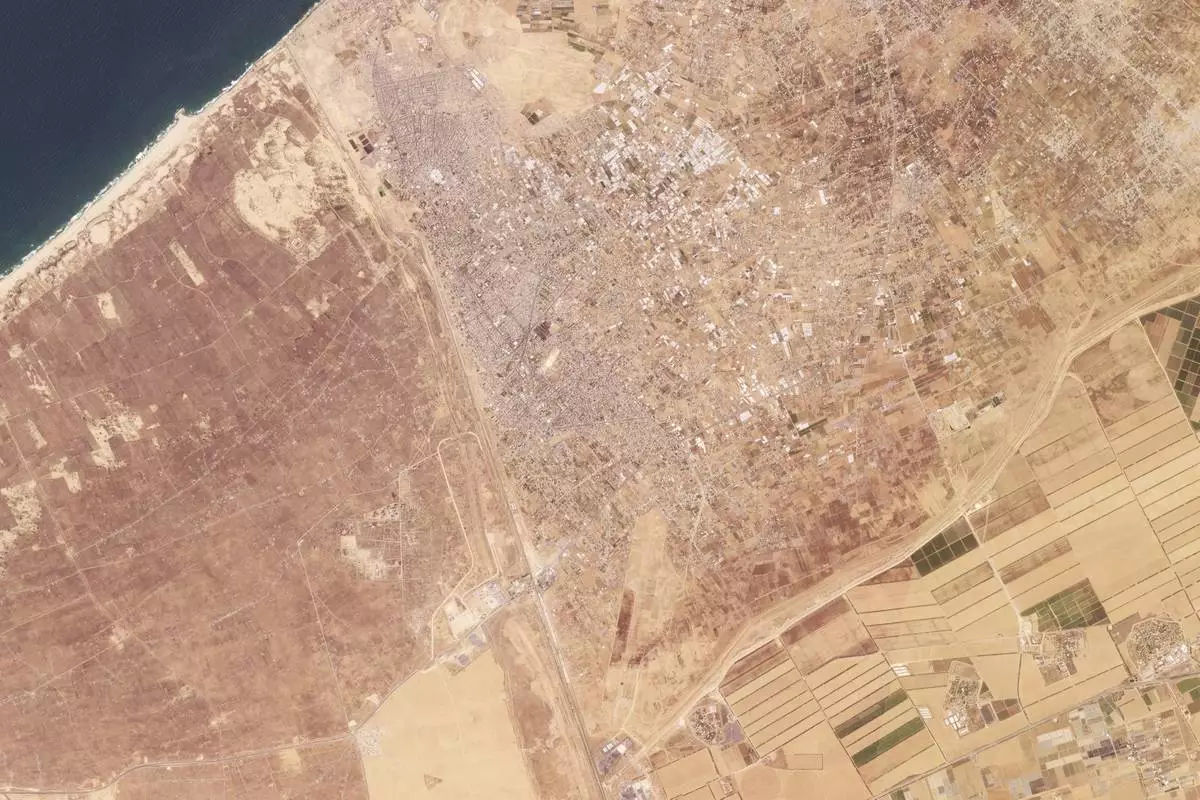
This satellite image taken by Planet Labs PBC shows Rafah in the Gaza Strip, center, Saturday, May 4, 2024. The Israeli army ordered some 100,000 Palestinians on Monday, May 6, 2024, to begin evacuating from the southern city of Rafah in Gaza, signaling that a long-promised ground invasion there could be imminent and further complicating efforts to broker a cease-fire. In the image, Egypt can be seen to the left, Israel to the bottom right corner. (Planet Labs PBC via AP)
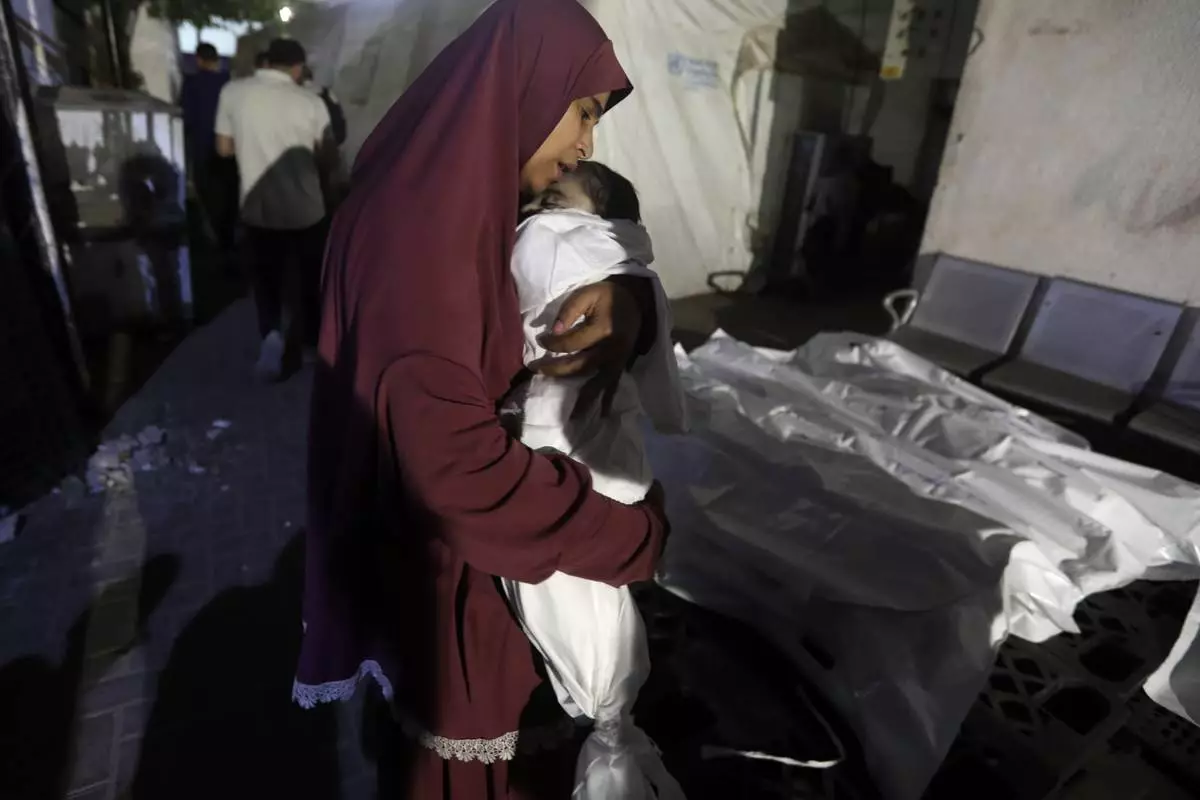
A Palestinian woman mourns her relative, 7-month old baby Hani Qeshta, who was killed in an Israeli bombardment on a residential building with Qeshta's family, at the morgue of Al Najjar hospital in Rafah, southern Gaza Strip, Sunday, May 5, 2024. (AP Photo/Ismael Abu Dayyah)
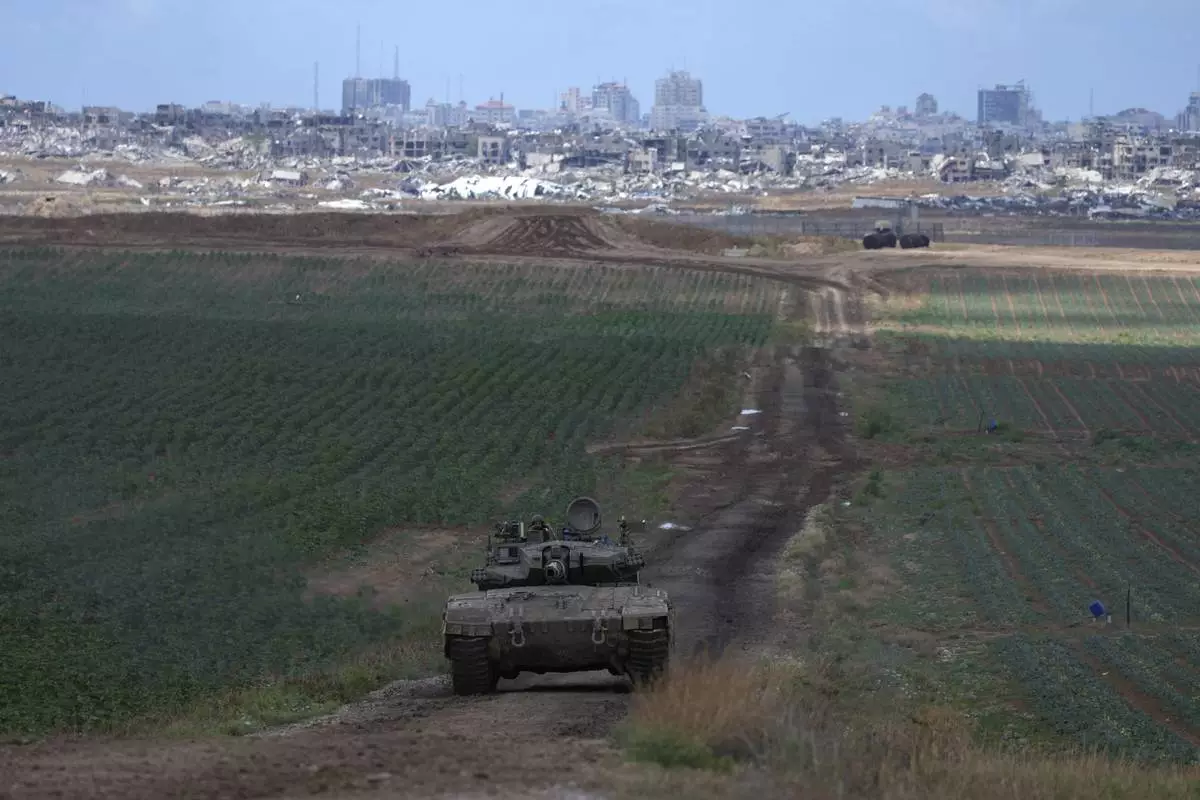
An Israeli Defense Forces tank drives away from the Gaza Strip, as seen from southern Israel, Monday, May 6, 2024. (AP Photo/Tsafrir Abayov)

Palestinians flee from the eastern side of the southern Gaza city of Rafah after the Israeli army orders them to evacuate ahead of a military operation, in Rafah, Gaza Strip, Monday, May 6, 2024. The order affects tens of thousands of people and could signal a broader invasion of Rafah, which Israel has identified as Hamas' last major stronghold after seven months of war. (AP Photo/Ismael Abu Dayyah)
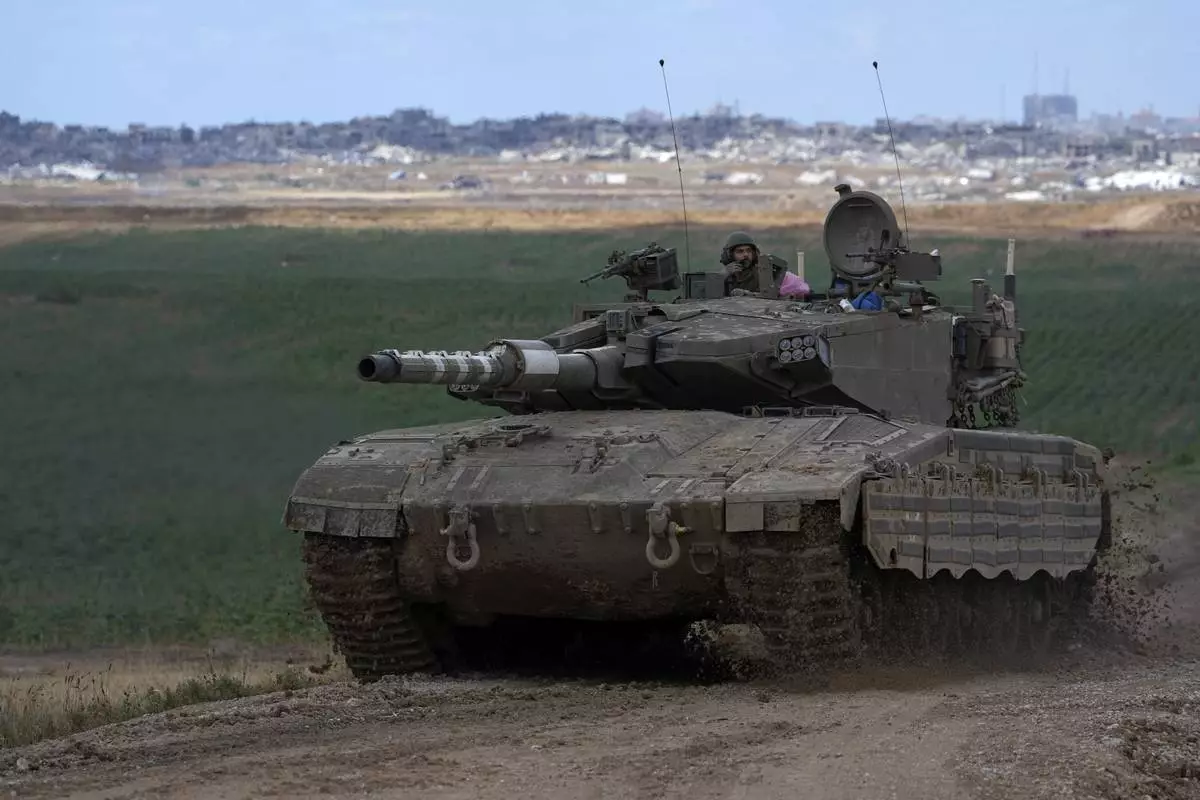
An Israeli Defense Forces tank drives away from the Gaza Strip, as seen from southern Israel, Monday, May 6, 2024. (AP Photo/Tsafrir Abayov)

An Israeli Defense Forces tank drives away from the Gaza Strip, as seen from southern Israel, Monday, May 6, 2024. (AP Photo/Tsafrir Abayov)
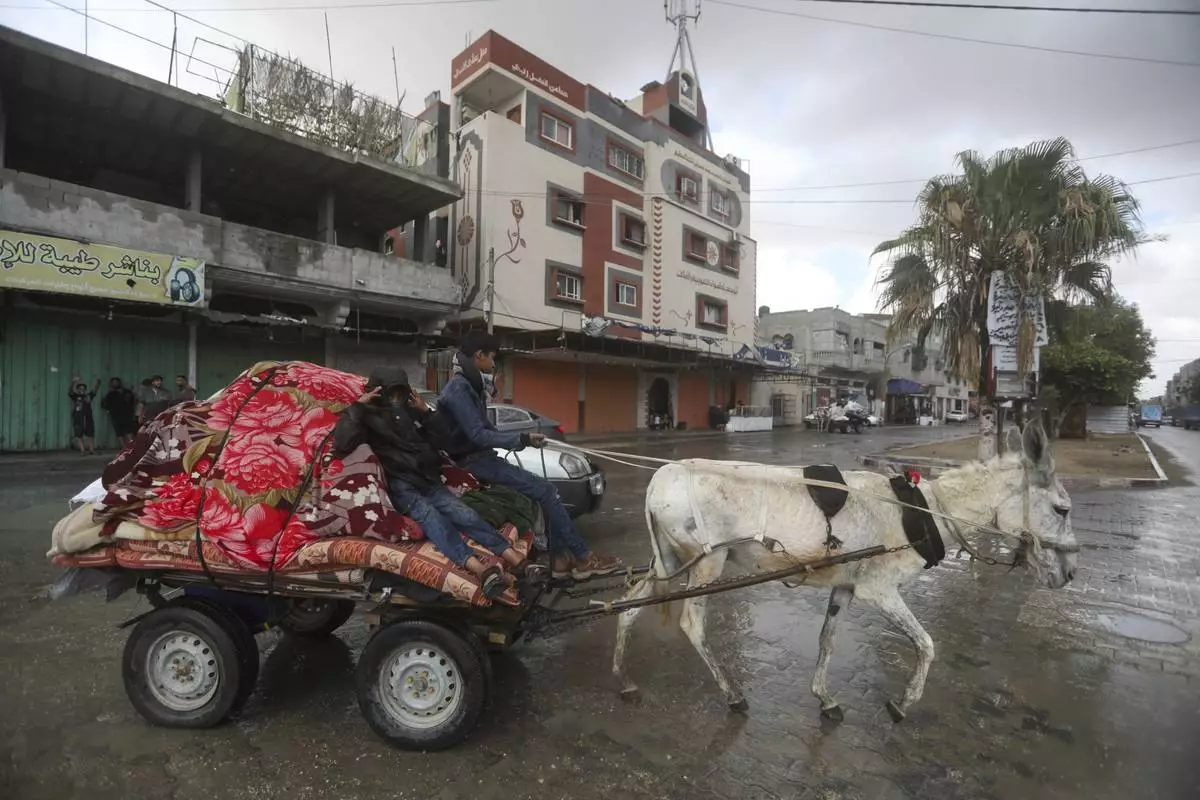
Palestinians flee from the eastern side of the southern Gaza city of Rafah after the Israeli army orders them to evacuate ahead of a military operation, in Rafah, Gaza Strip, Monday, May 6, 2024. The order affects tens of thousands of people and could signal a broader invasion of Rafah, which Israel has identified as Hamas' last major stronghold after seven months of war. (AP Photo/Ismael Abu Dayyah)
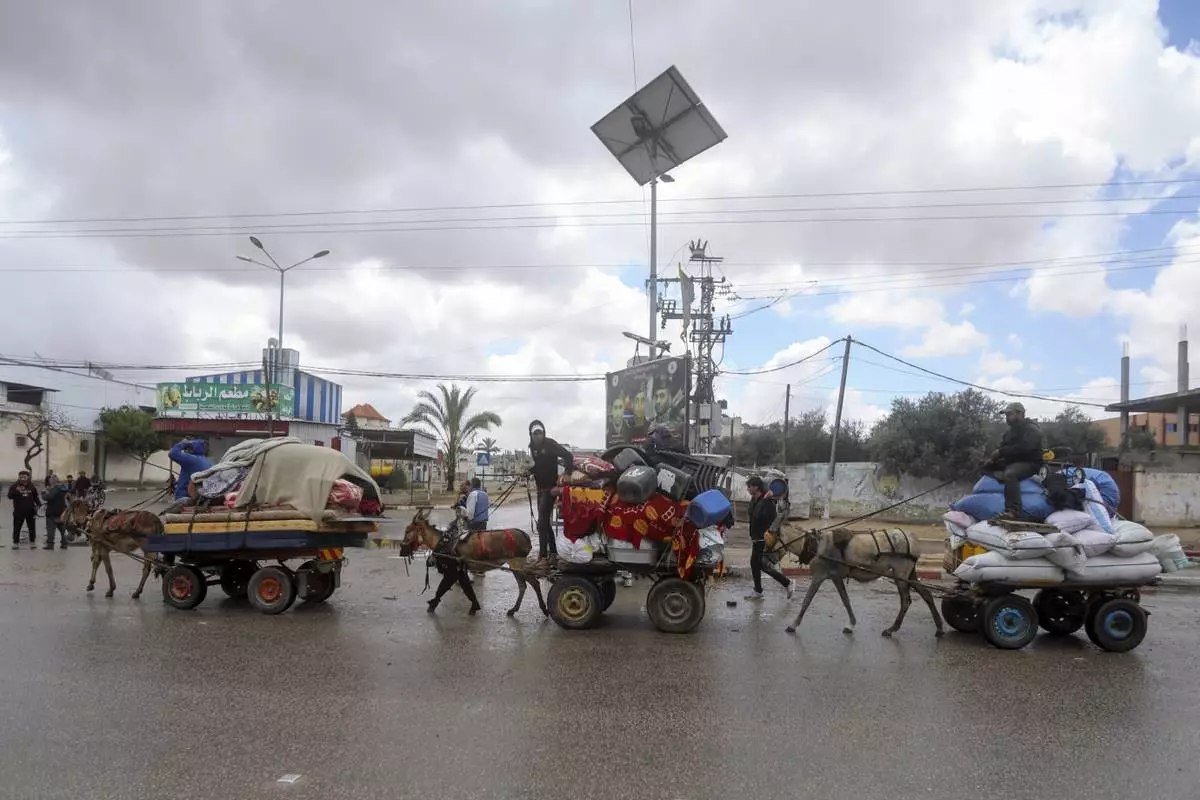
Palestinians flee from the eastern side of the southern Gaza city of Rafah after the Israeli army orders them to evacuate ahead of a military operation, in Rafah, Gaza Strip, Monday, May 6, 2024. The order affects tens of thousands of people and could signal a broader invasion of Rafah, which Israel has identified as Hamas' last major stronghold after seven months of war. (AP Photo/Ismael Abu Dayyah)
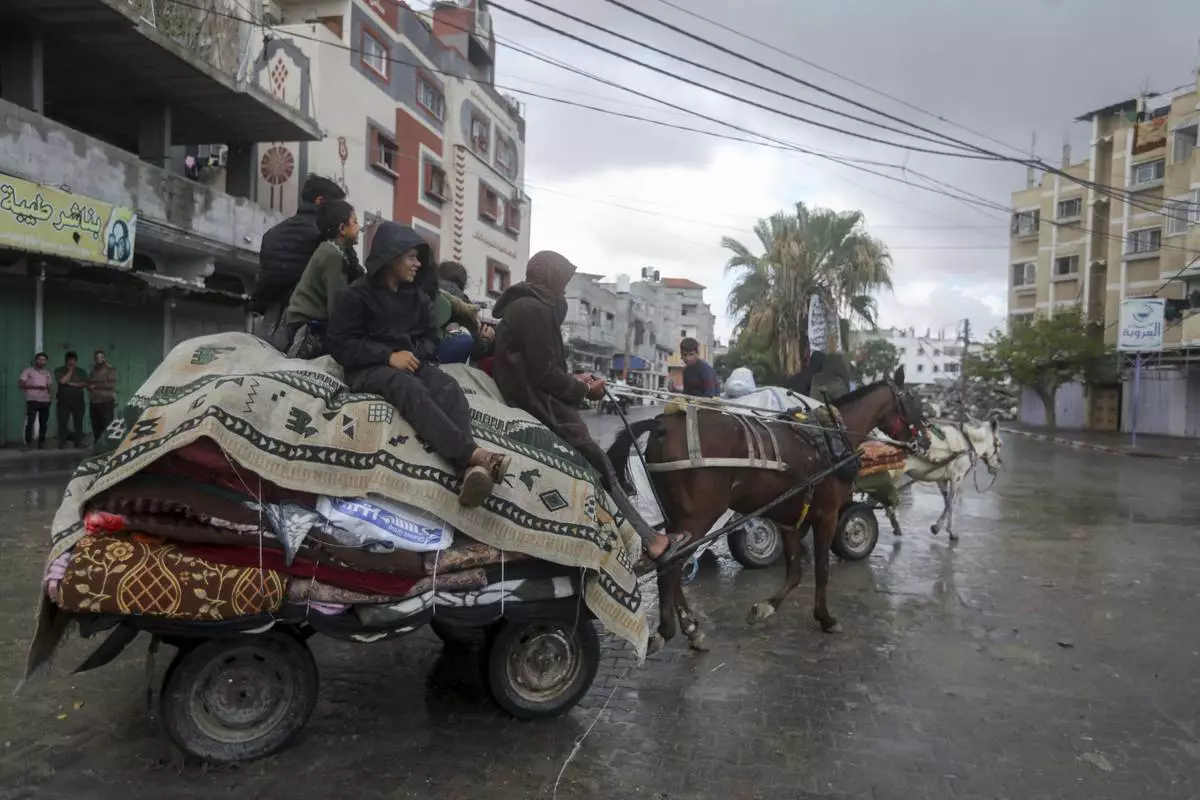
Palestinians flee from the eastern side of the southern Gaza city of Rafah after the Israeli army orders them to evacuate ahead of a military operation, in Rafah, Gaza Strip, Monday, May 6, 2024. The order affects tens of thousands of people and could signal a broader invasion of Rafah, which Israel has identified as Hamas' last major stronghold after seven months of war. (AP Photo/Ismael Abu Dayyah)
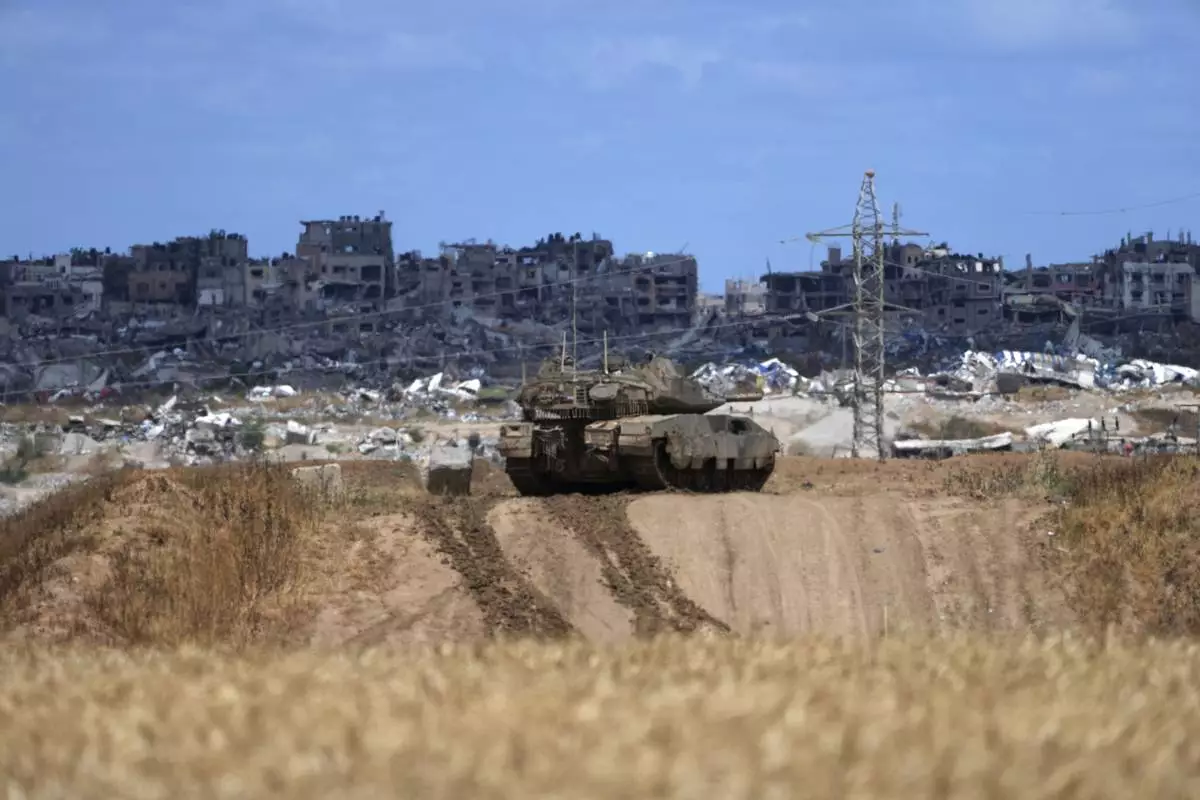
An Israeli tank overlooks the Gaza Strip, as seen from southern Israel, Monday, May 6, 2024. (AP Photo/Tsafrir Abayov)
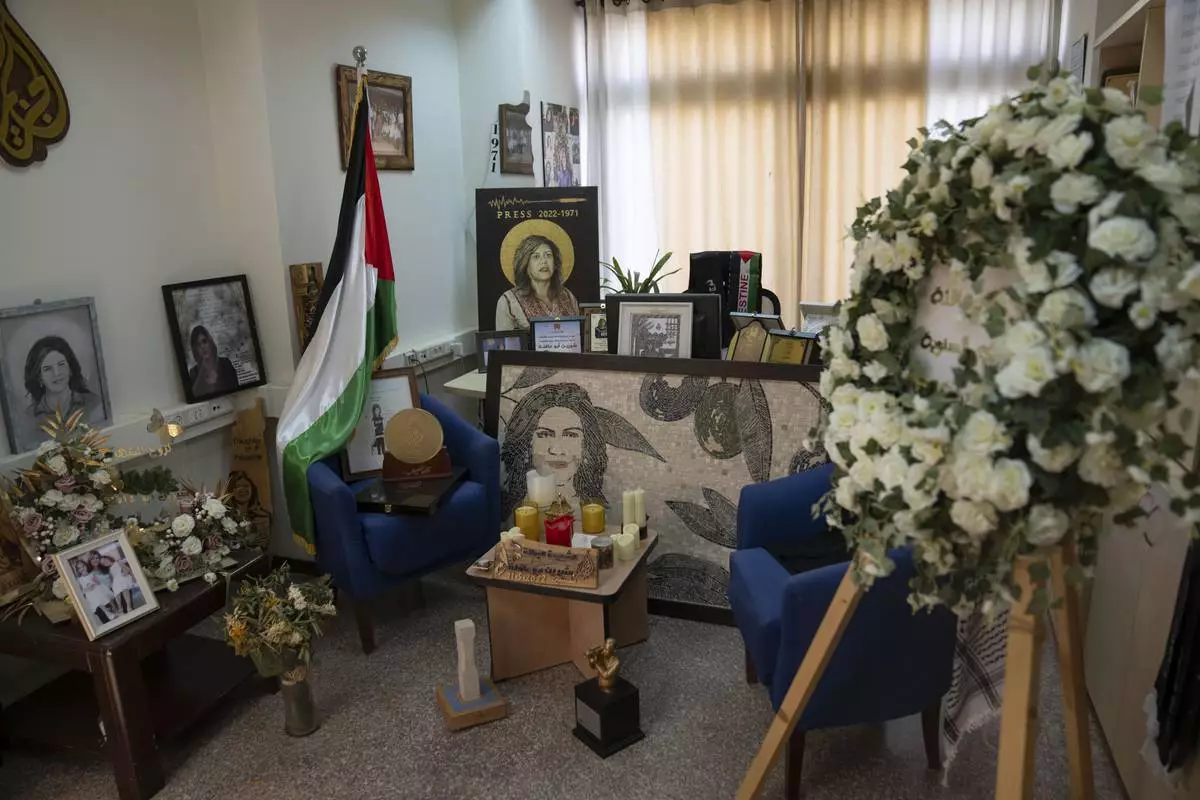
The office of late Al Jazeera network journalist Shireen Abu Akleh is decorated with memorial items, inside the network's office, in the West Bank city of Ramallah Sunday, May 5, 2024. Israel ordered the local offices of Qatar's Al Jazeera satellite news network to close Sunday, escalating a long-running feud between the broadcaster and Prime Minister Benjamin Netanyahu's hard-line government as Doha-mediated cease-fire negotiations with Hamas hang in the balance. (AP Photo/Nasser Nasser)
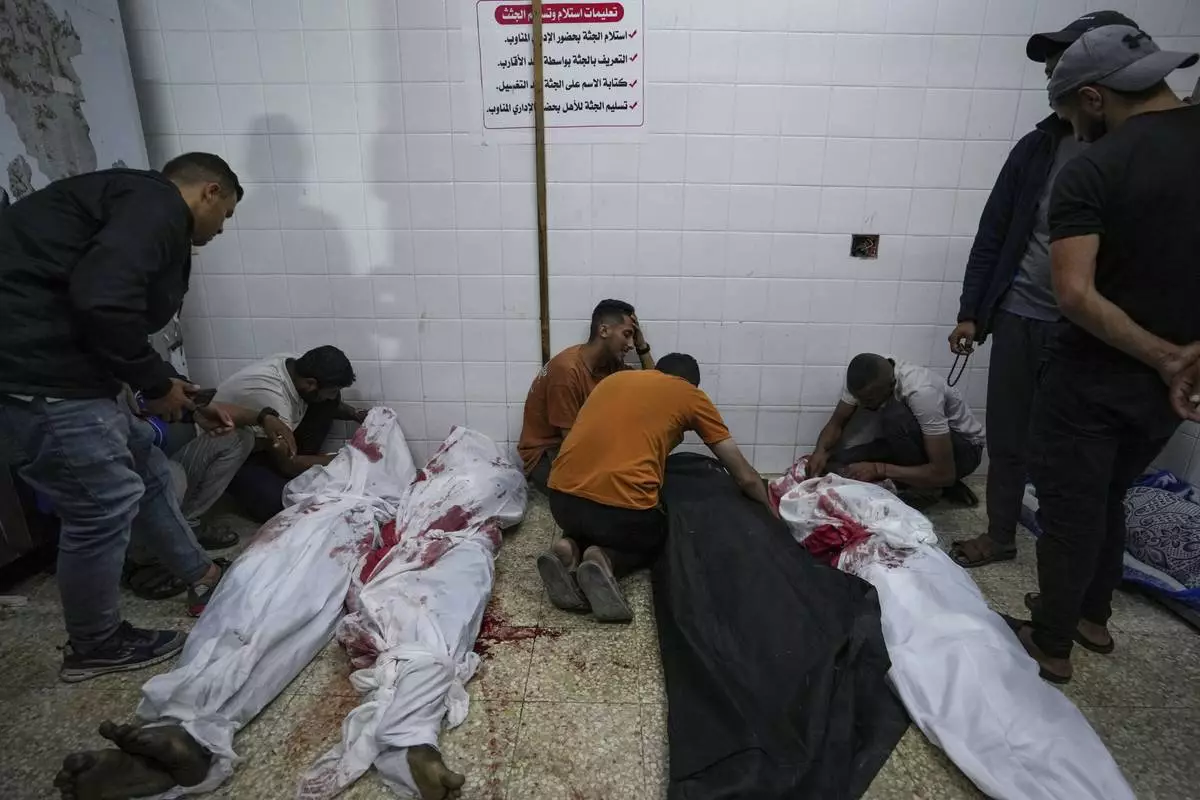
Palestinians react next to the bodies of their relatives who were killed in an Israeli airstrike in Gaza Stirp, at the Al Aqsa hospital in Deir al Balah, Gaza, Sunday, May 5, 2024. (AP Photo/Abdel Kareem Hana)
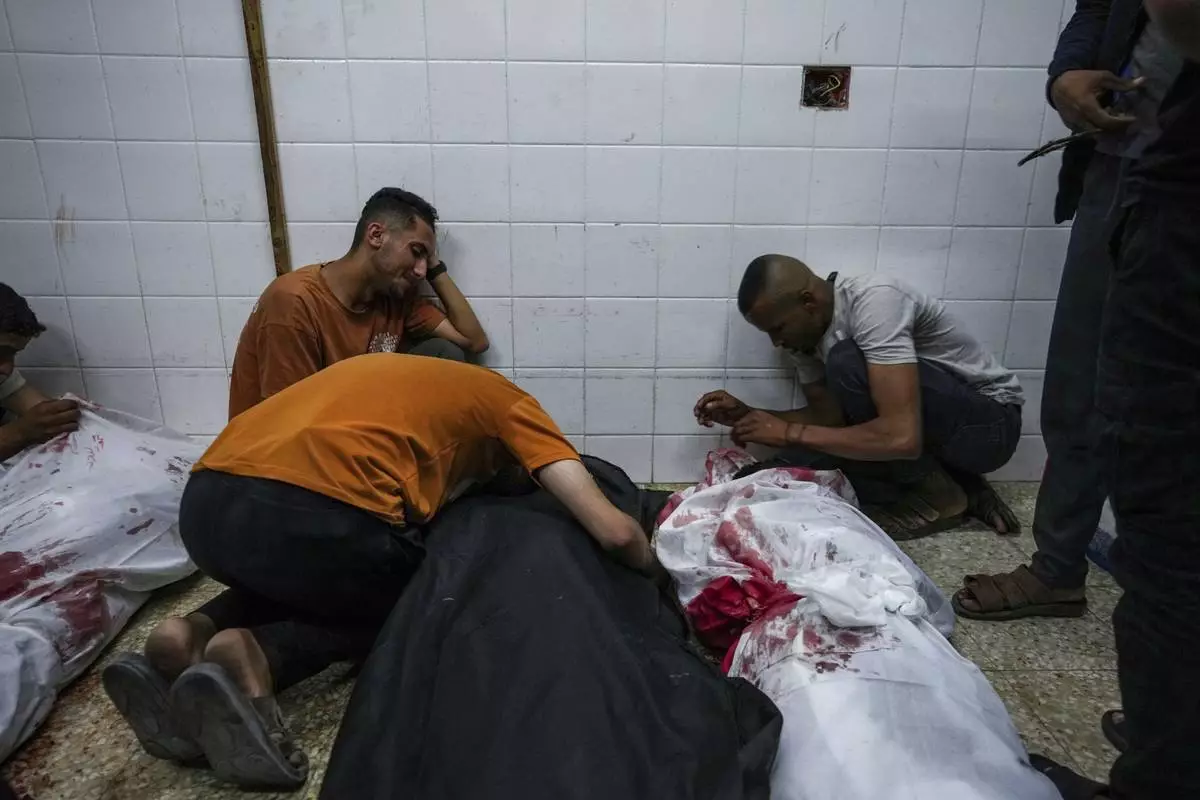
Palestinians react next to the bodies of their relatives who were killed in an Israeli airstrike in Gaza Stirp, at the Al Aqsa hospital in Deir al Balah, Gaza, Sunday, May 5, 2024. (AP Photo/Abdel Kareem Hana)
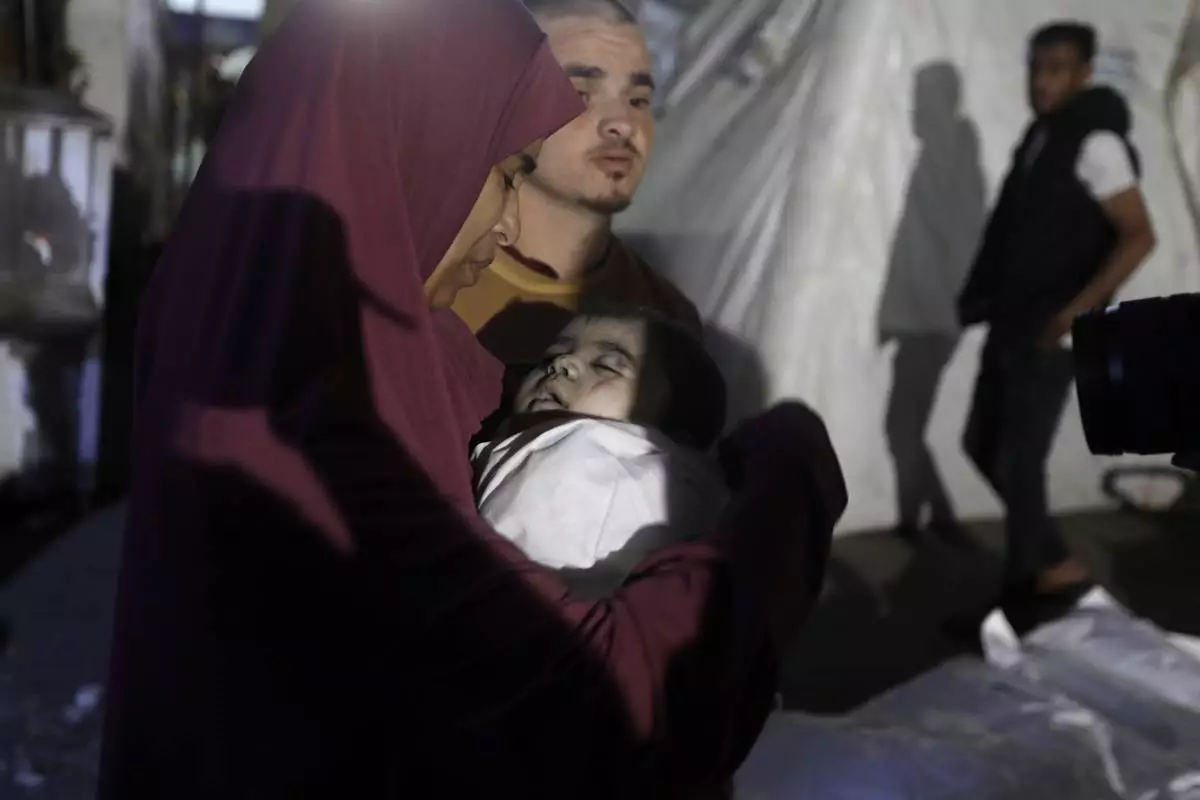
A Palestinian woman mourns her relative, 7-month old baby Hani Qeshta, who was killed in an Israeli bombardment on a residential building with Qeshta's family, at the morgue of Al Najjar hospital in Rafah, southern Gaza Strip, Sunday, May 5, 2024. (AP Photo/Ismael Abu Dayyah)
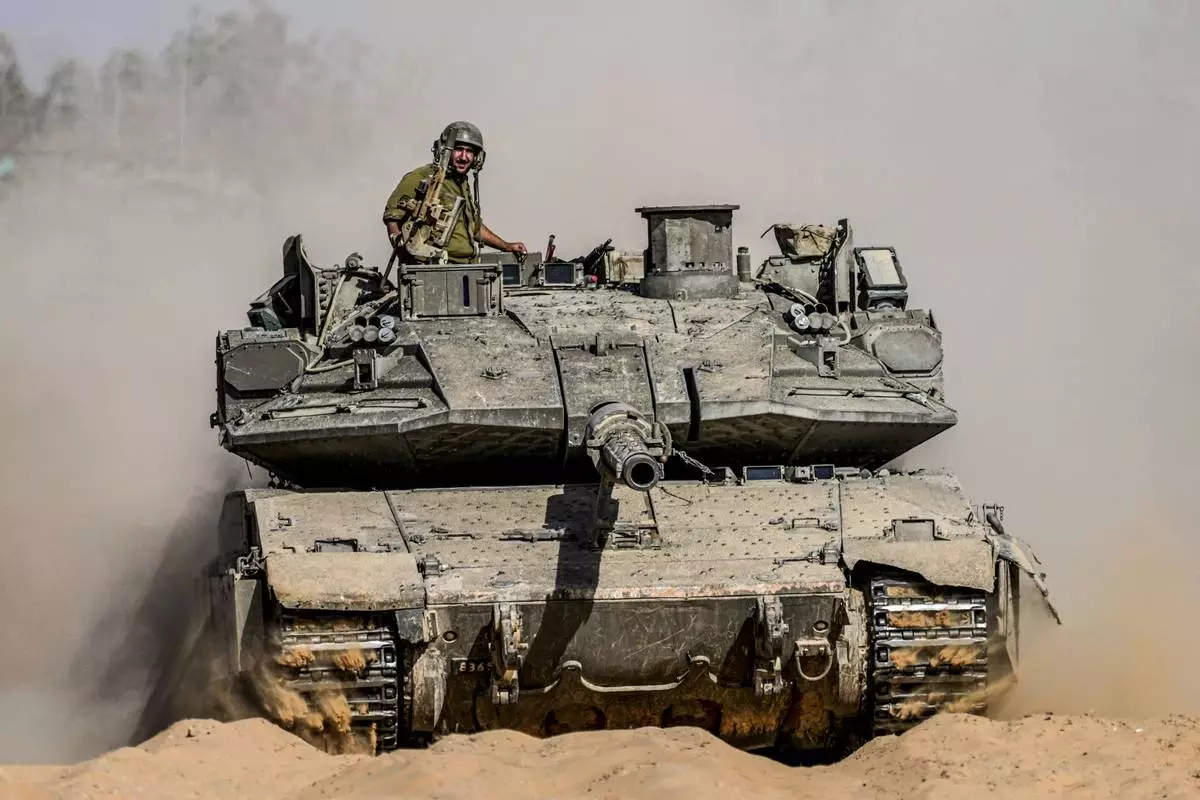
Israeli soldiers drive a tank at a staging ground near the border with the Gaza Strip, in southern Israel, Sunday, May 5, 2024. (AP Photo/Tsafrir Abayov)
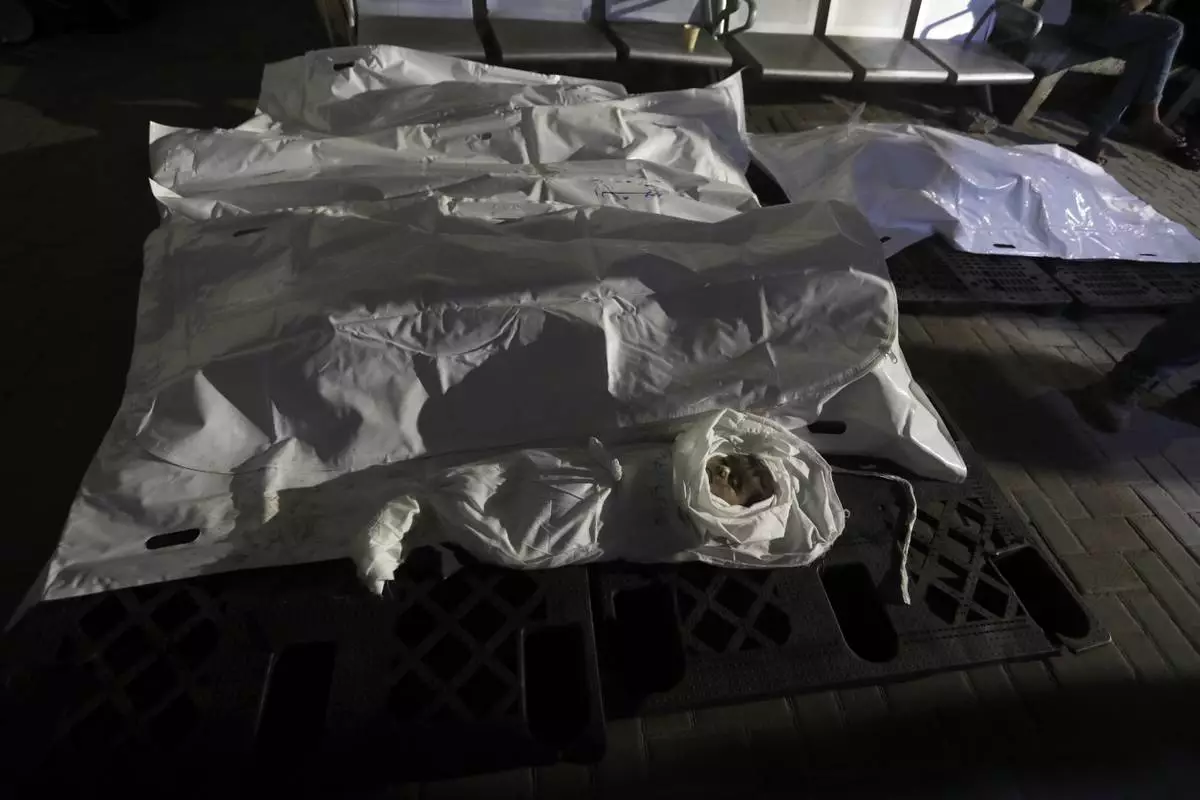
The Qeshta family is seen in body bags at the morgue of Al Najjar hospital in Rafah, southern Gaza Strip, Sunday, May 5, 2024. The family was killed in an Israeli bombardment on a residential building in Rafah. (AP Photo/Ismael Abu Dayyah)
























